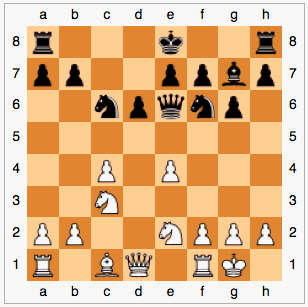Man Bests World
By Peter LloydEver feel like the whole world is against you? That’s how reigning world champion Garry Kasparov must have felt when MSN Gaming Zone pit him against a virtual, crowdsourced team comprised of anyone in the world with access to the Internet, advised by by a team of four young chess champions and a commentator who also made recommendations.
Kasparov was 36 years old when the game began in 1999. Playing white, he moved his king’s pawn to E4. The whole world—about 50-thousand players from more than 70 countries—countered with queen’s bishop pawn to C5. You can review the entire game in the Wikipedia entry Kasparov versus the World.
At the conclusion of the game, after the World resigned, Garry Kasparov called the contest, “the greatest game in the history of chess.” He attributed its greatness to the unprecedented level of creativity and innovation it inspired. “The sheer number of ideas, the complexity, and the contribution it has made to chess make it the most important game ever played.”
Similar responses meet crowdsourcing efforts in other creative endeavors, from the arts to new product development. Organizations who turn to the crowd for ideas marvel, not only at the host of ideas that arrive, but also at the invigorated thinking the new ideas inspire within the organization.
As Kasparov versus the World concluded, “Kasparov’s game produced a mixture of deep tactical and strategic ideas, and although Kasparov won, he admitted that he had never expended as much effort on any other game in his life.”
The Tenth Move
Considered an innovation—a move never before played in a recorded game—the World’s tenth move won the support of two official analysts within the World team. In response to their lobbying for 10...Qe6 on the World’s bulletin board, 53 percent of the team voted to make the move.
 Traditionally a more logical move is played at this point, and the innovative alternative energized the World team. At the same time, however, the crowd began to show one of the flaws inherent in wide-open crowdsourcing. The debate got hot, tempers flared, and eventually play suffered.
Traditionally a more logical move is played at this point, and the innovative alternative energized the World team. At the same time, however, the crowd began to show one of the flaws inherent in wide-open crowdsourcing. The debate got hot, tempers flared, and eventually play suffered.The ugliness arose from the same eventuality some might call a flaw in democracy—anyone can vote. At least in democracy, allowing anyone to vote gives everyone the sense that they have a voice, which, in theory, makes representative government work. In Kasparov vs. the World, allowing anyone to vote gave a voice to terrible moves, including illegal moves that could not be played.
The Whole Game
Thus, the need for wiser, cooler heads at the top of any crowdsourcing enterprise. I discuss some of these controls in Reducing Crowdsourcing Clutter.
See also: Kasparov Against the World: The Story of the Greatest Online Challenge
Peter Lloyd is co-creator with Stephen Grossman of Animal Crackers, the breakthrough problem-solving tool designed to crack your toughest problems.
Right Brain Workouts Explained
